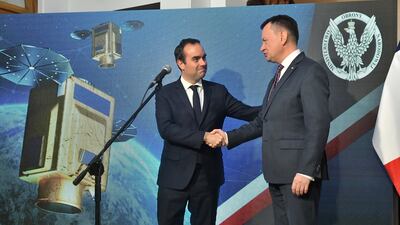Poland’s armed forces have announced a €575 million ($611.9m) deal to buy reconnaissance satellites in space.
Two satellites made by Airbus have been ordered for 2027, while another two will be available to share from 2023.
It is Poland’s first foray into military activity in space, and comes as it upgrades its armed forces after the invasion of Ukraine.
The space deal was agreed with France, where Airbus satellites are made and tested in Toulouse.
Polish Defence Minister Mariusz Blaszczak said the satellites would give Poland a valuable early warning system.
He said they could be used to monitor natural disasters as well as for military purposes.
“Space is becoming increasingly militarised and has an increasing impact on warfare,” said French Defence Minister Sebastien Lecornu.
From 2023, Poland plans to draw on a fleet of Airbus satellites called Pleiades Neo which provide high-resolution images from space.
Two of the Pleiades satellites were launched last year, but another two were destroyed in a failed launch on December 21.
The Vega-C launch vehicle lost pressure minutes after taking off from French Guiana and dropped into the Atlantic Ocean.
Airbus has not yet said whether it will replace the two satellites, to complete what was meant to be a four-part fleet.

But it said the two satellites launched last year had already shown their high image quality and geolocation accuracy.
The Polish deal will also see a receiving station built in the country to go with the two satellites expected by 2027.
This will give Poland “fully autonomous control” over the satellites, the country’s armaments agency said.
Poland plans to increase defence spending to 3 per cent of gross domestic product (GDP) after the Russian invasion of Ukraine shook up the geopolitical order in Europe.
The upgrade includes plans to recruit 20,000 new soldiers and will see the military budget trebled compared with 2015.
Several other countries including Germany, Norway and Denmark have announced increases in defence spending since Russia invaded Ukraine in February.


